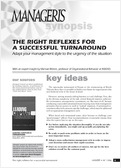Managing crises

What key principles to apply to avoid making mistakes in extremely destabilizing crisis situations?
Health warnings, industrial accidents, natural disasters, labor conflicts, information system crashes – the risk of crisis is very real for businesses. Aware that no one is safe, companies are increasingly prepared to respond in the event of a crisis. It is now very frequent for executives and managers to have attended training sessions and simulation exercises, thereby acquiring reflexes on how to organize crisis management teams and communicate with the press.
Despite these measures, crises are clearly difficult and trying experiences. In urgent situations, the workload to be tackled is huge, the stress intense, criticism rapid and often biting, the risk of making mistakes constant, etc. Under such circumstances, adopting the attitudes and behaviors that will help the company get through the crisis rapidly and with the least possible damage is a real challenge.
The publications that we have selected highlight a few key prerequisites for managing crises successfully. Three in particular merit special note:
– Organize things to keep the initiative: be careful not to exhaust your energy merely reacting to events.
– Protect the crisis management team from the confusion that generally reigns during a crisis, while keeping it in the loop on what is happening.
– Be particularly careful to ensure that communication is sufficient, credible and diplomatic.
SubscriberSign in
to download
the synopse (8 p.)
VisitorI want to buy
this synopsis (8 p.)
VisitorI want
to subscribe
See also

Preparing for an uncertain future
In times of turmoil and strong uncertainty, how can you manage beyond simply coping with the situation? One solution consists in accepting the inevitable nature of uncertainty: the challenge does not consist in minimizing it, but in managing it.

Increase the resilience of your organization
All organizations are confronted with the risk of crises. Rather than vainly attempting to avoid them, you had better develop the capability to absorb them and to learn the lessons. How can you acquire and cultivate resilience?

![Entreprises et crises [Companies and Crises]](images/ouvrages/l/2374.jpg)

![Cellules de crise [Crisis Management Teams]](images/ouvrages/l/no.jpg)
![Manager les situations difficiles [Managing delicate situations]](images/ouvrages/l/2254.jpg)